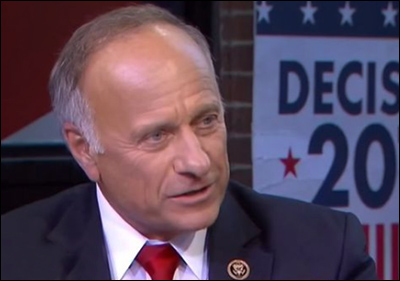By Jim Ellis
May 22, 2020 — The June 2 primaries are fast approaching, and though very few House incumbents are in danger of joining Rep. Dan Lipinski (D-IL) as a member who lost re-nomination in 2020, there is a serious intra-party challenge unfolding in northwest Iowa.Hawkeye State veteran Congressman Steve King (R-Kiron) has been in political trouble during this entire term after making racially charged statements that led to the Republican conference stripping him of his committee assignments. Just within the past 10 days, King was again rebuffed in his attempt to re-claim his former duties.
The controversy is largely responsible for King drawing a very serious challenge from state Sen. Randy Feenstra (R-Hull/Sioux County). Feenstra has served six two-year terms in the state Senate, and previously as the Sioux County treasurer and Hull City administrator.
Through the March 31 candidate filing period, Feenstra had raised over $844,000 for his primary campaign and still had more than half to spend. Rep. King, on the other hand, was virtually out of money. His cycle receipts were under $302,000 and he had less than $27,000 in the bank.
Several polls have been released since the race took shape early this year and, up until now, all were from the Feenstra campaign pollster, American Viewpoint. At the end of January, due to his strong name identification from representing the district since the beginning of 2003, Rep. King posted a 53-22 percent advantage.
Three months later, AV detected King’s lead over Feenstra had dissipated to 41-34 percent. During the first week of May, the race grew even tighter with the challenger pulling to within three points, 39-36 percent. Feenstra was also picking up key endorsements, such as those from the US Chamber of Commerce and the Business-Industry Political Action Committee (BIPAC). He also earned support from the National Right to Life Committee and secured an “A” rating from the NRA on the conservative social issues front.
Clearly, Feenstra’s momentum train is building steam and Wednesday a Public Opinion Strategies poll for the America’s Future Fund organization (May 16-18; 400 likely IA-4 Republican primary voters) found the challenger actually moving past Rep. King, 41-39 percent. POS segmented their numbers and it becomes clear that this will be a turnout primary.
According to the survey analysis, Rep. King only leads within his conservative base by a single percentage point, while Sen. Feenstra secures a 12-point advantage among those who describe themselves as either “moderate” or “liberal” Republican voters.
The geographic dispersion is even deeper. Iowa’s 4th District sits in the state’s north/ northwest section beginning at the Nebraska-South-Dakota-Minnesota border and stretching just past Mason City in the north, then down through Ames and close to the Des Moines suburbs in the south, and then back toward the western border to encompass the Fort Dodge and Sioux City areas.
In Sen. Feenstra’s home Sioux County base, he dominates. In this geographic sector, where both candidates are well known, Rep. King trails by a whopping 21 percentage points. In the areas in which Feenstra is far less known, i.e., the Des Moines media market and the central rural areas, Rep. King still maintains a substantial 10-point lead in the former and a strong 18-point advantage in the latter domain.
It is in the areas outside of the far northwestern region where the Feenstra financial advantage will pay dividends. In the remaining days, it is the challenger who will have the resources to become better known in his weaker areas in order to cut King’s deficit while strengthening his voter turnout operation where the Feenstra campaign apparatus already dominates.
Considering Rep. King’s baggage and Sen. Feenstra’s strong record and campaign, we could well see the second incumbent of the election cycle soon being denied re-nomination in his party primary.
There are three other candidates on the Republican ballot, and though none of them are registering significant levels of support, there is a caveat in Iowa election law that could send the contest into a post-primary district convention. If no candidate receives 35 percent in the primary election, party delegates will convene weeks later to choose the nominee in a convention vote.
Since the polling has consistently shown the minor candidates not receiving enough support to keep the leader under 35 percent, it is likely this race will be decided on June 2.

